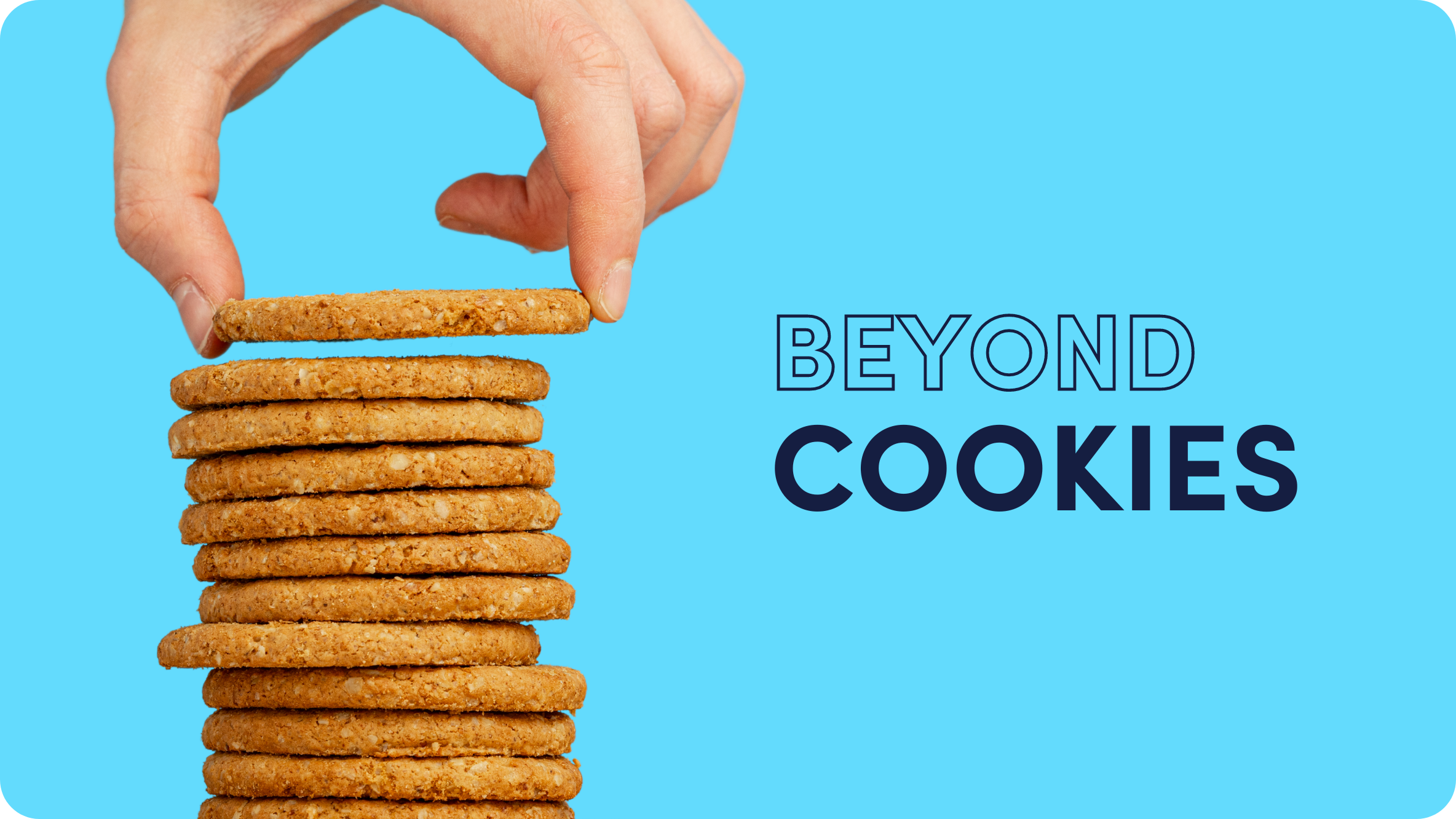How To Make Your Next Blog Post Go Viral

You invest a considerable amount of time and resources in creating and publishing relevant, informative content that you know your audience will find useful.
You don’t skimp on research and you certainly don’t compromise on getting detailed imagery to go with your posts…you might even say your blog posts look somewhat like a work of art.
However, most of the content you’ve published gets minimal impressions and even less shares, and it’s certainly not paying off on your time investment.
If that sounds familiar, it’s because it’s extremely commonplace: in fact most blog posts and content don’t actually get read.
This is known as the “Oh Crap Moment”.
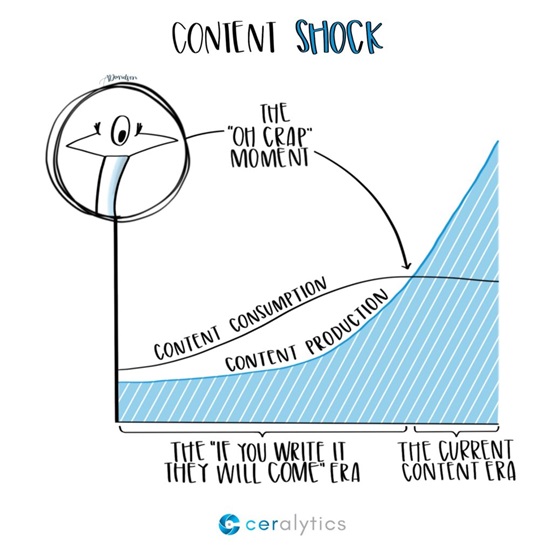
Welcome To The Era of Content Shock
Content marketing is one of the best strategies that you can use to educate your existing customers, acquire new customers and expand your overall business presence.
Around 72% of marketers agree that content marketing helps to increase engagement and the number of leads.
However, getting enough eyeballs on your content today is far more challenging than it used to be 5 years ago. We are living in the era of content shock, meaning that businesses are producing more content than people have time to consume.
In the era of content shock, most content is wasted because people don’t have time to read it.
In these circumstances, there is a way to receive maximum traction from your content, and that is to make it go viral. Going viral is key to minimizing the effects of content shock.
What Is Viral Content?
Viral content is an article, image or video that rapidly surges in popularity by receiving lots of re-shares and links.
With viral marketing, you let others share your content for you. It encourages a practice where people actually love your content and share it with their family and friends because of personal satisfaction.
What Makes Content Go Viral?
In this TED video, Dao Nguyen explains how the post “32 Memes That You Should Send To Your Sister Immediately” from BuzzFeed received over 3M views.

It was able to go viral primarily because it contained some secret ingredients of a viral content recipe. People felt a connect with the post and they got the feeling – “this is us”. Besides, the post made them laugh. So, what are those ingredients that can make your content go viral?
5 Ingredients of Viral Content
Viral content is content marketing gold. Every business desires it but few are actually able to win it. Here are the top 5 ingredients of viral content:
- Capture What Really Matters To Your Audience
- Produce ‘Positive Content’
- Relatable Content
- Make Your Content Practically Useful
- Ensure That Your Content is Shared By Influencers
1- Capture What Really Matters To Your Audience
This is perhaps the most important aspect of viral content marketing. Instead of producing content that you wish to create, your aim should be to prepare content that your audiences want to read.
How? The answer lies in knowing your audience.
To better understand the way your audience thinks, create personas for each type of audience member. This will help you identify their likes and dislikes, preferences, style and sensibilities, and will help form the base of your viral content marketing strategy.
Tools such as MakeMyPersona from Hubspot are incredibly useful in humanizing customer personas. Simply answer a few questions and you have your customer persona ready to use.
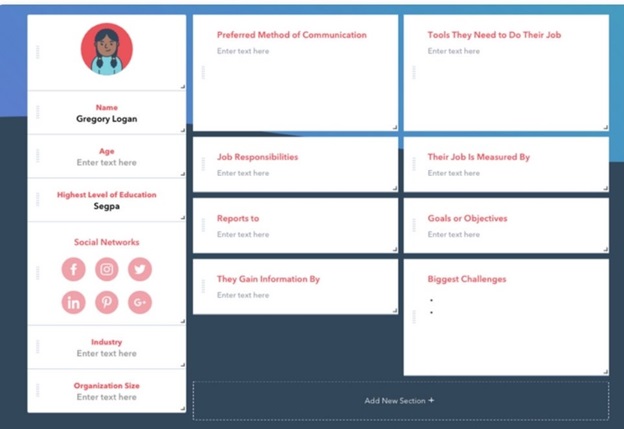
Here are some questions you can ask about your audiences:
- Who are they?
- Where are they going?
- What do they care about?
- What do they want to know?
The answers to the above questions can help you prepare focused content that people will love to share.
2- Produce ‘Positive Content’
Content should be positive in nature because positive content performs better than negative content. The viral piece should create a surge in emotions after reading or viewing. It should cause joy, laughter or irony. To be more specific, “AWE!!” is the most successful form of emotion for viral content.
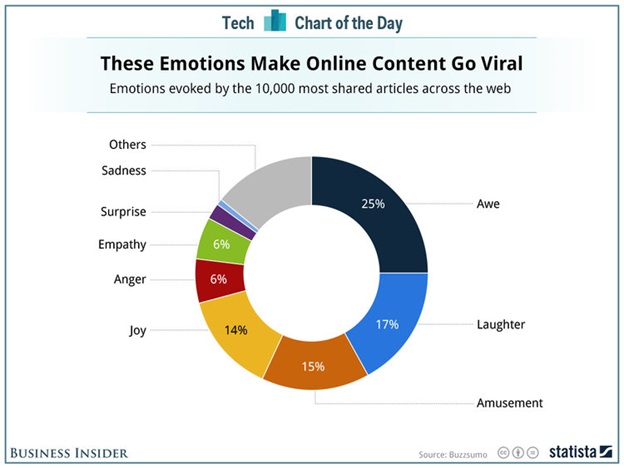
The team at “media 2 inspire” conducted a study analyzing 21 hours of YouTube videos, 53 hours of TV shows, 104 hours of film, 7,255,860 words of New York Times articles, and 3,733 Facebook posts to find out the emotions more or less likely to make content go viral. Here is what they found:
- Videos that contain ‘hope’ have been viewed a greater number of times.
- Posts that depict nature, vastness, gratitude and art received the maximum number of reactions per post.
- Articles that were longer and evoked positivity were liked and shared the most.
- Among movies and TV dramas, content that promoted ‘hope’ received a positive response from the viewers.
As the research suggests, positive emotions that can evoke ‘hope’ or powerful happy emotions like ‘awe’, ‘laughter’ and ‘joy’ are the biggest factors that make content go viral.
3- People Should Feel “This is Us” (Also Known As RELATABLE CONTENT)
The more people can identify with your content, the more they will like it and share it.
Creating content that people feel they connect with is also known as “relatable content”. This is the kind of content that speaks to the core. Here are the 9 golden rules of creating relatable content.
- Rule 1: Talk or write in a language that mimics your target audience.
- Rule 2: Use lots of visuals – the human brain is able to process images 60,000 faster than text.
- Rule 3: Be original and create something that is 100% unique.
- Rule 4: Theme your content and visuals in a manner that appeals to your demographic.
- Rule 5: Discuss the most difficult questions your audiences want answers to.
- Rule 6: Leverage the power of storytelling to convey your message.
- Rule 7: Make it human and humorous. A piece about “What happens when your HR manager rejects your leave?” will receive more shares and comments because it relates to the reader at a personal level.
- Rule 8: Write about things that most of your audience can identify with in one way or another.
- Rule 9: Don’t just say, “this needs to be done” but also show “how” it is done.
4- Make Your Content Practically Useful (Remember, Skyscraper Content?)
It is important that your content is somehow relevant and useful. People like to help each other and do good for others. If your content reflects this, it will be that much more shareable.
In a case study done by Backlinko, it was revealed that Chris Gimmer of Bootstrapbay was able to generate around 17,584 visitors in one day. That’s incredible.
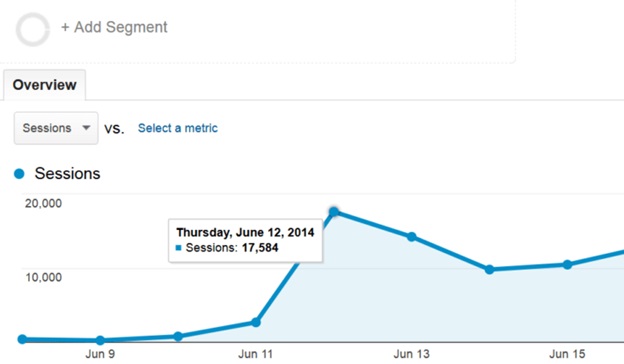
What was the exact strategy he followed? He made use of the Skyscraper technique to create content.
What is the Skyscraper technique?
- Step 1: Find competitive keywords related to your niche using BuzzSumo and look for content that received a lot of social shares. Extract words or phrases from the title of the content that people might use in a Google search and save all the URLs that have good content.
- Step 2: Study the content pieces you found in step 1 and create something better than that. To create something extraordinary and unique, you need to devote a lot of time. The piece should contain super useful content and high quality visuals. One great way to prepare insightful content is to prepare a list of questions that people normally ask related to your main topic and answer all such questions before writing the content. You can find the major pain points and related questions that people ask on sites like Reddit and Quora.
- Step 3: Promote the content you produced. You can use sites like Reddit, Quora, Facebook, LinkedIn, Twitter, Pinterest and others depending on where your ideal audience might be present.
5- Ensure That Your Content is Shared By Influencers
For most content, you will definitely need a helpful push to get it to go truly viral.
This push can be provided by influencers (and that doesn’t mean just celebrities, micro influencers are the next big thing). Content promoted by influencers gets more exposure overall, reaches a far wider audience, and is more likely to be shared.
How can you ensure that your content is shared by influencers? Follow these strategies:
Network With Influencers
Keep in touch with influencers and network with them. When you are no longer a stranger, you’ll get a more positive response. An outreach experiment found that a previous connection with the influencer boosted response rates by up to 63%.
Conduct Influencer Interviews
Give influencers a reason to share your content. Conduct interviews with influencers or quote them in your articles.
Tag or Mention Influencers On Social Media
Make sure to tag or mention relevant influencers when you share your content across social media. Tagging an influencer helps expand your content’s reach across the entire influencer community.
Some Examples of Viral Content
1- The Complete Social Media Image Size Guide From Canva
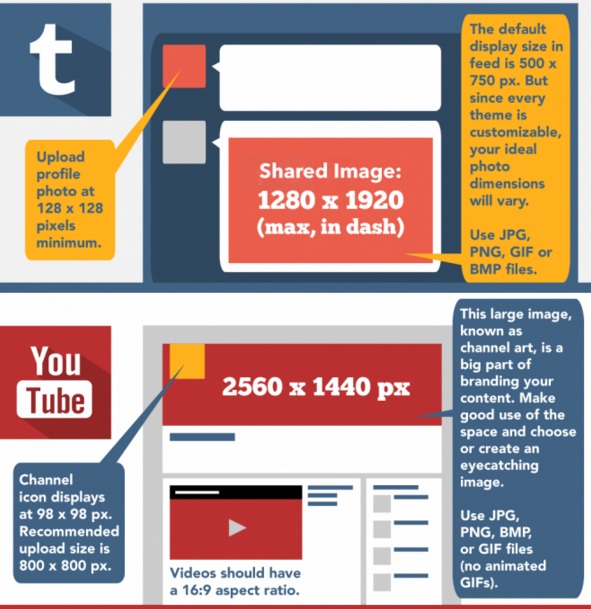
This visual content from Canva generated over 10,000 social shares because it provided a useful, visual solution to one of its audience’s most pressing problems. When you offer a real solution to your customers, they in return will share it massively.
2- 9 Things You Should Never Share on Facebook by Post Planner
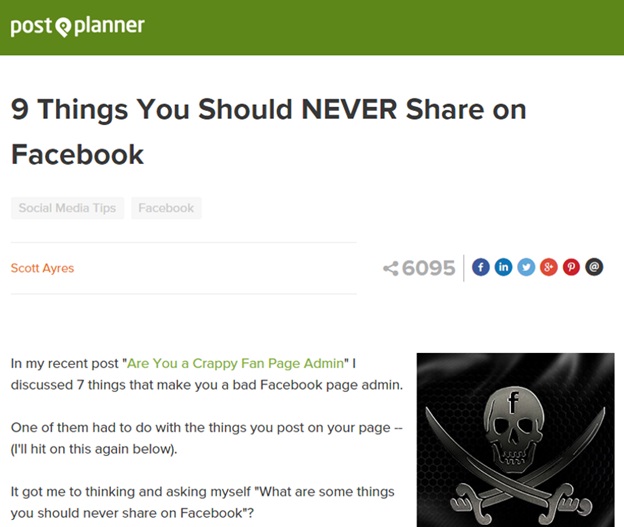
This post was shared by users more than 6,000 times. The idea was simple: talk to users about something they do often, and that even carries high risk consequences. So many people can relate to the content, they are compelled to pass it on. The result is a viral marketing piece.
3- What Happens One Hour After Drinking a Can of Coke by Renegade Pharmacist
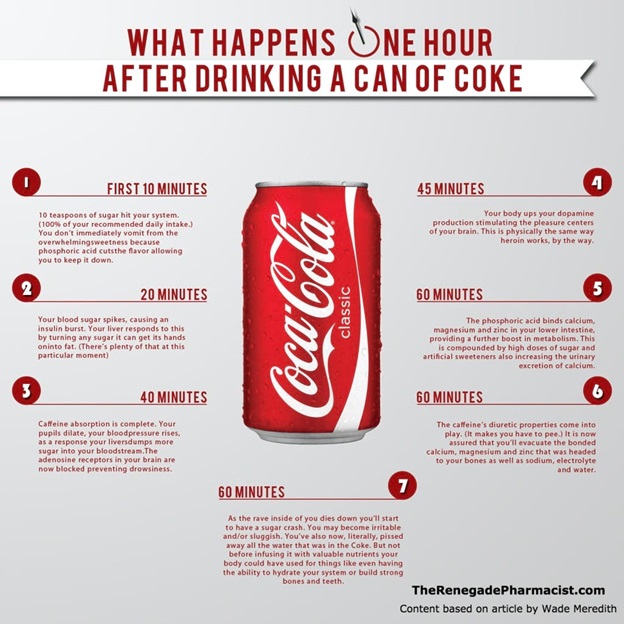
This infographic received a massive number of 44,000 shares via Facebook alone.
The content revealed some “secrets” about an iconic soft drink that the audience has known and loved for decades. Coke has always been part of their daily life, yet here are some details that the audience never knew about. The content piqued their curiosity, so they naturally shared it with others.
Final Thoughts
Making your content go viral is no easy task. But it’s been done before, and it can happen again.
Selecting the right topic and preparing exciting, unique and relatable content are keys to viral content marketing success.
Follow the tips above and see what kind of results you can achieve.
Happy viral content marketing!



